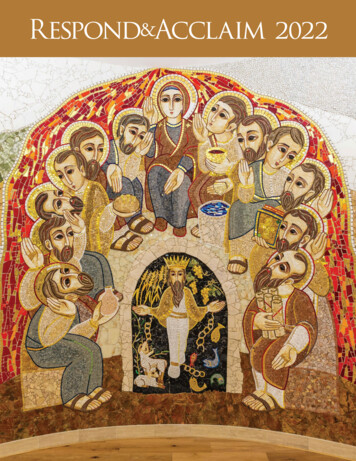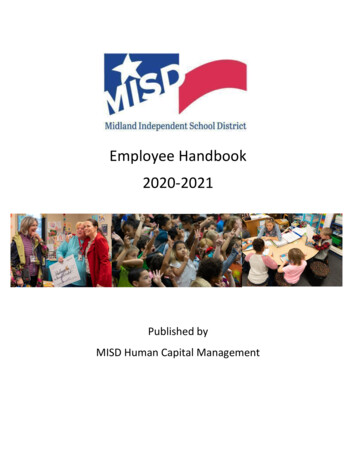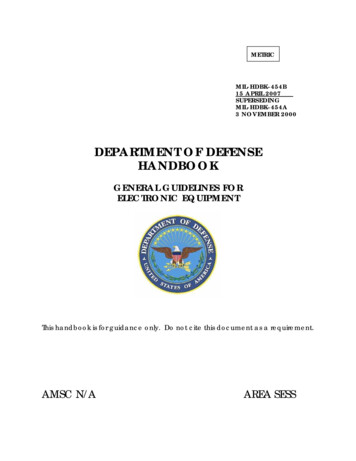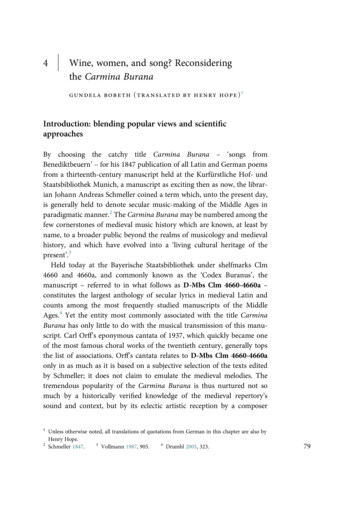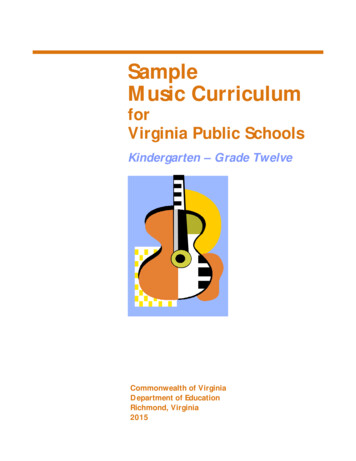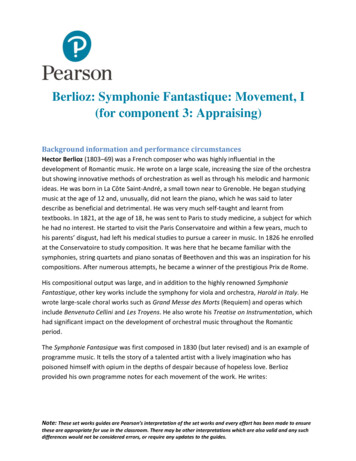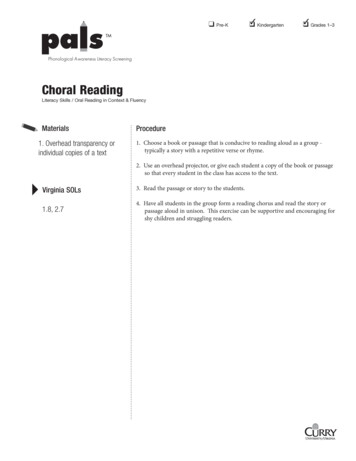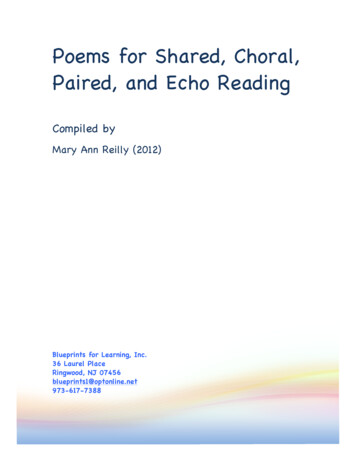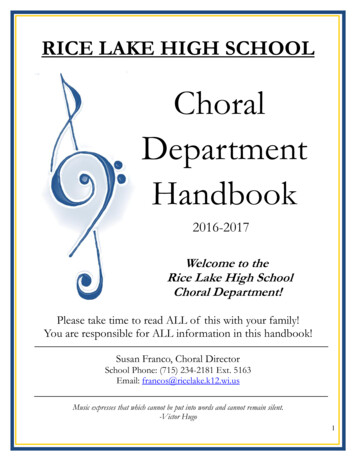
Transcription
RICE LAKE HIGH SCHOOLChoralDepartmentHandbook2016-2017Welcome to theRice Lake High SchoolChoral Department!Please take time to read ALL of this with your family!You are responsible for ALL information in this handbook!Susan Franco, Choral DirectorSchool Phone: (715) 234-2181 Ext. 5163Email: francos@ricelake.k12.wi.usMusic expresses that which cannot be put into words and cannot remain silent.-Victor Hugo1
TABLE OF CONTENTSGeneral Rules & Expectations3Discipline Plan4Attendance Policy4Grading Policy5-7Warrior Rehearsal Expectations8Attendance at Performances8Concert Etiquette8Laude Points8Concert Attire9-10Letter Program11Choral and Music Curricular and Extra Curricular Courses12WSMA Honors Choir and District & State Solo & Ensemble13Choral Event Calendar14All District Music Calendar15Music Boosters16Communication162
General Rules and ExpectationsThe success of a choir depends on how it rehearses. How it rehearses depends on the conduct andcooperation of each student. Rehearsals are the place to correct mistakes. Be patient, attentive, careful,and cooperative in observing these rehearsal expectations. Good behavior, attitude and self-discipline areessential to producing a GREAT CHOIR. If you are successful, the Choir is successful.Students are expected to:1. Be Respectful Respect students, teachers and music equipment. Do NOT us your cell phone during rehearsal unless we are doing an activity that requires amusic app.2. Be Ready NO GUM! Bring pencil, music and textbook to class every day. Be ready to listen and/or sing when asked.3. Be Responsible Be responsible for your own behavior and act accordingly. Take care of school and personal property, in this case, uniforms, music, textbooks, rehearsalspace and instruments. Students will be expected to pay for lost or damaged music and folders.Students will be assigned uniforms and the correct items need to be turned in at the end ofeach school year. Keep the classroom and practice rooms clean and organized.School Policy on Riding Home from School-Sponsored EventsStudents must ride to school-sponsored events on the bus, but may ride home with their parentsfrom a school sponsored event if the teacher receives a note that the parents(s) will be taking thestudent(s) home and the teacher sees the parent(s) before they depart. Mrs. Franco will carry a signout sheet at events away from home for parents to sign their kids out.If a student wishes to ride home with someone other than his or her parent, including anotherstudent’s parent, this needs to be approved by Mr. Pacholke before leaving for our event.Students will not be allowed to leave with anyone other than their parents without writtenapproval from Mr. Pacholke.3
Discipline PlanAll disciplinary acting taken for inappropriate behavior will follow this procedure:1. The student will receive a verbal warning concerning expected behavior.2. The student and I will make an appointment to meet and discuss his or her behavior in order todevelop a plan for improvement.3. If our plan does not effectively change the behavior, the student and I will meet with his or herparents or guardians to devise another plan.4. If the problem persists, we will involve the administration.* Some behaviors are totally inappropriate for the classroom and dictate immediate removal fromthe classroom without a reminder or warning being issued. Also, chronic violation of classroom rules thatinfringe upon the rights of others to learn may indicate a more deeply rooted problem that requires specialattention.Attendance PolicyAttendance of all choir students is required at all rehearsals and performances. This is one of our mostfundamental working principles. We cannot be effective without every member of our team. We are onlyas strong as our weakest link. Everyone is important.If a student has a medical emergency or is unable to participate due to a medical concern, he or she shouldbring in a note from a parent.The performance calendar is published in the spring before the school year begins. Students and familiesare expected to make accommodations to follow this schedule. Again, this is the only way for our choir tobe effective as a group. I do the best to avoid scheduling conflicts with other school activities. If youbecome aware of a conflict, please let me know at the earliest possible date in writing so I have time to tryto resolve the issues.4
Grading Policy for RLHS Music DepartmentPerformance Courses: Band and ChoirRationale for the shift toStandards-Based Assessment and Grading:To move toward more authentic, performance-basedevaluations that will provide feedback on progress andproficiency levels and are individualized to the abilitylevel of each student. Formative feedback will befrequent and explicit.Learning DispositionsMastery-Oriented vs. Performance-Oriented GridStudents will be encouraged to have mastery-orientedlearning dispositions. This will be a focus ofrehearsals, sectionals and possible lessons.Goals: To implement and assessment and grading programbased on best practices in education.To build every student’s belief that he or she canlearn, to build each student’s sense of academicoptimism and to insure that each studentunderstands his or her progress toward eachachievement standard.To create independent musicians creating qualityperformances.To improve student achievement by assessing forlearning.To teach students to set goals, manage their time andpractice, create practice and achievement plans, andreflect on growth.5 Performance Skill Levels(Based on the National Standards for Music)Advanced-A Superior performance,outstanding in nearly every detail. Precollege/college level musician.Accomplished-An excellent performance,minor issues. Accomplished high schoolmusician.Proficient-A good performance, lackingfinesse and/or interpretation. A beginninghigh school level musician.Intermediate-A fair performance, basicweaknesses to overcome.Novice-A beginning level performance,weaknesses to overcome.Mastery Dispositions vs. Performance ientedStudentsMain interest is in learning theskill/content.Main interest is in appearingcompetent or better thanothers regardless of levelachieved.Willing to take on difficult tasksbeyond present capability.Stick to tasks that are familiar,known quantities.View mistakes as learningopportunities.View mistakes as evidence oflack of competence andtherefore to be avoided.Tend to understand timemanagement and goal setting.Tend to be procrastinators.Not afraid to take risks.Tend to quit or give up whenthey perceive they are not goodenough.Category WeightingPerformance Skills(Playing/Singing)Musical Understanding (Aural andWritten Theory)Goals/Planning/Reflection50%Rehearsal Contributions (No Count)0%25%25%5
Four Levels of Skills Achievement from theNational Model Cornerstone AssessmentsLevel 4Exceeds Standards/Show GrowthALevel 3Meets StandardsBLevel 2Approaches StandardsCLevel 1Emerging Skill DevelopmentDAssessment Types: Formative and SummativeStudents will be assessed using formative assessments,which will provide explicit feedback to help themimprove on the designated skills. These assessmentswill not be graded, but will be assessed. Feedback willappear in Skyward, but will not count toward the finalgrade. The purpose of these assessments is to trackprogress and keep students and their familiesinformed about individual growth.Grades will be completely differentiated andappropriate for each student and will be based oneach student’s weaknesses (two performance skillweaknesses, one written theory weakness, and onelistening weakness). Each student will be placed on anachievement continuum based on his/her currentlevel of ability (novice, intermediate, proficient,accomplished, or advanced). The appropriate rubricfor that skill level will be used to assess growth onareas in need of improvement.Daily work and formative assessments will not begraded, but will be entered into Skyward as “nocount” entries to show progress on learning targets.Grades will only count on summative assessments.There will be small summative assessments testingindividual skills and larger quarter/semestersummative assessments testing all learning targets. Allassessments and goal sheets/practiceplans/reflections can be improved and resubmittedsince the goal is student achievement and growth.Retaking assessments or correcting goals/practiceplans/reflections can only be done until the last twodays of the quarter. Final grades are based oncompletion of requirements and summativeassessments.Summative AssessmentsSummative assessments will be given todetermine growth on the learning targets. Finalgrades will be based on summative assessments.Summative assessments can be retaken until thelast two days of the term when final grades needto be determined. Students who reach Level 4 (ExceedsStandards/Shows Growth) in their weakareas and complete all performancerequirements for the course will earn an “A”. Students who reach Level 3 (MeetsStandards) and complete all performancerequirements for the course will earn a “B”. Students who reach Level 2 (ApproachesStandards) and complete all performancerequirements for the course will earn a “C”. Students who reach Level 1 (Emerging) andcomplete all performance requirements forthe course will earn a “D”. All other students will earn an “I” forinsufficient evidence of learning until theydemonstrate skills achievement or grades aredue. Once grades are due, the “I” will bechanged to an “F”.Assessment RubricsClick here to see the rubrics that will be used toassess and grade student progress. These rubricsinclude descriptions of each achievement level oneach learning target. There will also be a copy ofthis document in Google Classroom for studentaccess.Click here to see Assessment RubricsAssessment Rubric6
SPECIFIC LEARNING TARGETSStudent Performance Skills (SPS)Performance Skills grades will be weighted moreheavily than the Student Musical UnderstandingSkills because this is a performance based course.Performance SkillsStudents will be assessed on the followingperformance skills. Tone-resonance, control, focus, consistency,clarity of sound. Intonation-accuracy to printed pitches Rhythm and Pulse Accuracy-accuracy ofnotes/rests, duration, pulse, steadiness, andcorrect meter Technique-artistry, attacks, releases, control ofranges, musical and/or mechanical skills. Interpretation, Musicianship-style, phrasing,tempo, dynamics, emotional involvement. Articulation (winds)-clarity of the execution ofeach note Sticking (percussion)-quality and control of theexecution of each note Other Performance Factors-choir of literature,appropriate appearance, poise, posture, generalconduct, mannerisms, facial expression, memory Scales-perform full-range chromatic and majoror minor scales in all twelve keys by memory(scale assignments determined by achievementlevel) Rudiments (percussion)-perform requiredrudiments with correct sticking and technique Sight-Reading-ability to apply music literacyskills to read and perform new music after oneminute of preparationSight-Reading Process:1. Play the scale that corresponds with the keysignature.2. Clap and count the rhythms.3. Play it or sight-sing it once before completingthe official performance.4. Perform for judge(s).Goals/Planning/Reflection1. Complete Short-Term and Long-Term GoalsSheet2. Complete Biweekly Reflection Sheets3. Create a practice plan incorporating appropriatepractice strategiesStudent Musical Understanding (SMU)Written Theory SkillsStudents will be assessed on the following writtentheory skills: Written Theory Skills Identification of pitches on the grand staff Note names and values (whole, half, quarter,eighth, sixteenth, dotted half, dotted quarter,dotted eighth). Rest names and values (whole, half, quarter, eighth,sixteenth, dotted half, dotted quarter, dottedeighth) Time signatures Identification of road map directions: repeat signs,D.C., D.S., Fine Ties and slurs Identify and define dynamic markings Identify and define tempo markings Identify and articulation markings Flats, sharps, natural signs Whole step/half step Enharmonic pitches Tetrachord building Scale building (major, natural minor, harmonicminor, melodic minor) Key signature (identification and writing) Chromatic scale building Solfege Circle of 4th/5th Rhythm AnalysisAural (Listening) Theory SkillsStudents will be assessed on the following aural theoryskills: Interval Recognition (ascending only)-identify theinterval you hear Chord Recognition-identify the major, minor,augmented, diminished chord you hear Rhythm Dictation-write the rhythm you hear Rhythm Identification (visual identification whilelistening to rhythm) Scale Recognition- (visual identification whilelistening and aural identification) Pitch Differentiation-identify higher or lower,sharp or flatRehearsal ContributionsSee rubric for rehearsal expectations.7
Warrior Rehearsal ContributionsRehearsal expectations/contributions will appear in Skyward as an achievement level to reflect student contribution,but will not be figured in final grades (“no count”). See the Warrior Rehearsal Contribution rubric for expectations.Students should be aware that lack of positive contributions to rehearsal directly affects learning and therefore hasan effect on formative and summative assessment results which will affect grades.Attendance at PerformancesPerformances at concerts are mandatory, since this is a performances based course and performing for an audienceis the culmination of our achievement on our standards. Performances are our final assessments of ourachievement on the current repertoire and they provide an opportunity to demonstrate our achievement under newconditions that encourage students to apply their skills in a real-life situation. This requires performing at theirhighest ability level.Students who miss concerts for any reason, will receive an incomplete (I) showing insufficient evidence of learningof those performance standards until they perform in front of the music staff to demonstrate those skills. Studentswill be assigned appropriate music for this performance and will be assessed on achievement of music standards.The “pre-concert playing exam” achievement scores are tied to the final performance and will therefore not beentered into the grade book until the final performance is complete.Students may redo this performance exam until the last week of the term, since final grades are due to the office.After this point, any incomplete (I) grades will be replaced with an “F” due to insufficient evidence of achievement.Concert EtiquetteAs performers, you will need to help with this one! Your family needs to know that our concerts are not athleticevents. It is not appropriate to talk, text, or use your cell phone, as this can disturb others around you and theperformers. Absolute appropriate behavior is required when not performing to respect and appreciate all the hardwork that is being performed. You should not enter the concert hall during a piece – instead, enter only duringapplause. No food, drink, or candy should be brought into the performance venue.We record all of our concerts! Noises and distractions can ruin these recordings. Please help educate your familiesthat we take great pride in our music making, and we expect excellent etiquette from our audiences as well as ourperformers.There will be a post-concert grade entered into Skyward under the Rehearsal Contributions category as these twosets of expectations are closely related.Laude PointsStudents who complete both years of Symphonic Choir and one Class A solo or duet can earn 1 Laude Point.Students who complete both years of Robed Choir and one Class A solo or duet can earn an additional LaudePoint.8
Concert AttireThe following guidelines explain expectations for student performance attire. It is the student’sresponsibility to keep the concert attire in professional shape. In other words, don’t leave it lying at thebottom of a closet or in the trunk of a vehicle. (Let it air out!) There is to be absolutely no smoking in oraround concert attire. Students are responsible for lost or damaged attire.Concert robes, stoles, skirts and sashes: The school district supplies our students with concert robes,stoles, skirts and sashes. The robes are dry-cleaned each summer and maintained by the choir throughoutthe school year. Students are to respect their assigned garment as school property and treat it with care.ANY MISSING GARMENTS at the end of the year will result in the student being charged the fullreplacement cost of a new garment piece. Many audience members listen with their eyes first, so lookinggood is important. Students must supply the following for performances.Symphonic ChoirWomen1) Black skirt and royal blue sash (assigned and provided by school).2) Black shoes with closed heel and toe (provided by student). No flip-flops, sandals, or athletic shoes. AndNO heel taller than 2”, flats would be highly preferred.3) PLAIN White (no other color or embellishments), button down, dress shirt with collar and long or ¾length sleeves (provided by student).4) Accessories are limited to small items that do not draw attention away from the ensemble.5) Hair must be pulled back out of face/eyes. Perfume, sprays and lotions must be used at aminimum.Men1) PLAIN White (no other color or embellishments), button down, dress shirt with collar and long sleeves(provided by student).2) Black dress shoes AND black socks (provided by student). No flip-flops, sandals, or athletic shoes.3) Colored or plain long dress tie (provided by student). No bow tie.4) Solid black dress pants (provided by student).5) Accessories are limited to small items that do not draw attention away from the ensemble.6) Hair must be pulled back out of face/eyes. Cologne, sprays and lotions must be used at aminimum.Robed ChoirWomen1) Black pants or anything shown under robe must be black (provided by student).2) Black shoes with closed heel and toe (provided by student). No flip-flops, sandals, or athletic shoes. AndNO heel taller than 2”, flats would be highly preferred.9
3) Accessories are limited to small items that do not draw attention away from the ensemble.4) Hair must be pulled back out of face/eyes. Perfume, sprays and lotions must be used at aminimum.Men1) PLAIN White (no other color or embellishments), button down, dress shirt with collar and long sleeves(provided by student).2) Solid black dress shoes AND black socks (provided by student). No flip-flops, sandals, or athletic shoes.3) Solid black dress pants (provided by student).4) Colored or plain long dress tie (provided by student). No bow tie.5) Accessories are limited to small items that do not draw attention away from the ensemble.6) Hair must be pulled back out of face/eyes. Cologne, sprays and lotions must be used at aminimum.Chamber ChoirWomen1) Black formal dress (school provided).2) Black shoes with closed heel and toe (provided by student). No flip-flops, sandals, or athletic shoes. AndNO heel taller than 2”, flats would be highly preferred.3) Accessories are limited to small items that do not draw attention away from the ensemble.4) Hair must be pulled back out of face/eyes. Perfume, sprays and lotions must be used at aminimum.Men1) Formal Tuxedo which includes pants, vest, white shirt, bow tie and jacket (school provided)2) Black dress shoes (provided by student).3) Accessories are limited to small items that do not draw attention away from the ensemble.4) Hair must be pulled back out of face/eyes. Cologne, sprays and lotions must be used at aminimum.10
Choral Lettering ProgramIn-School Activities:200 Points Selection and Participation in WSMAState Honors Treble or Mixed Choir100 Points Attend an Honors Choir or Festival Perform in School’s Musical orRenaissance Festival Perform a *1 Solo or Ensemble at DistrictOut of School Activities:100 Points* Attended Summer Music Camp or Clinic(100 pts. per week)* Performing in a Community Theater50 Points* Private Piano Lessons (50 pts. per semester)* Private Voice Lessons (50 pts. per semester)* Selected for a music scholarship* Auditioned for a performing group, theater orscholarship* Participation in a performing group(50 pts. per semester)* Participation in a Master Class-Singing50 Points Per Event Perform in Choir Concert Perform in Voice It Up, Jazz Choiror Rhythm Show Choir Audition and/or selected as alternate forWSMA State Honor Treble or Mixed Choir 25 Points Receiving a 1 rating on a Solo or*Ensemble at District or State Festival Music Librarian (50 pts. per semestersemester. At least one hour a week)* Uniform Manager (Robes and Skirts50 pts. per semester)* Honor Point Secretary (50 pts. per semester) Selected for Chamber Choir*member40 Points Per Event Receiving a II rating on a Solo or Ensembleat the Solo/Ensemble Festival Audition for Chamber Choir Accompany Solo or Ensemble event(s)Attendance at a professional, college, high school(not your own), or middle school performance.Staple the program to your point’s sheet.Membership in a community or church musicalgroup at least 80% of time (25 points perMembership in a rock, country, jazz or alternativeperforming ensemble-singing. (25 points persemester)Attendance at a Master Class as an audience* Students need to turn in 1000points to letter in choir. *20 Points Per Event Singing the National Anthem at SportingEvents throughout the school yearForms like this will be available from Mrs. Franco and must be turned in by the end of the month, for thosepoints to be counted toward lettering. This is the student’s responsibility.Date of EventActivity/EventPoints Awarded11
Curricular Performance EnsemblesSymphonic Choir (Grades 9-10) Prerequisite:Audition and/or consent of directorAll choir members in grades 9-10 will enroll in this performance ensemble. Vocal techniques, music theory and musichistory are included in the studies of this course. Students will learn the importance of their contribution in preparingperformances and they will gain an appreciation of the process involved in creating musical excellence. Studentsperform in four concerts a year and participate in Large Group Music Festival. All choir students have the opportunityto participate in the solo/ensemble festival, Rhythm Show Choir, and Voice It Up-Vocal Jazz.Robed Choir (Grades 11-12) Prerequisite: Audition and/or consent of directorAll choir members in grades 11-12 will enroll in this performance ensemble. Vocal techniques, music theory and musichistory are included in the studies of this course. Robed Choir offers students an opportunity to engage in theperformance and understanding of distinctive and challenging vocal literature in an enjoyable and encouragingenvironment. Students will learn the importance of their contribution in preparing performances and they will gainan appreciation of the process involved in creating musical excellence. Students perform in four concerts a year andparticipate in Large Group Music Festival. All choir students have the opportunity to participate in the solo/ensemblefestival, Rhythm Show Choir, and Voice It Up-Vocal Jazz.Chamber Choir (Grades 9-12) Prerequisite: Audition ONLYThis ensemble cannot be found in the course guide. It is an auditioned ensemble of 9-12 students. There are only 16available spots for 4 basses, 4 tenors, 4 altos, and 4 sopranos. It is an elite group that rehearses on Monday morningsand during the regularly scheduled choir times. This group is self-taught ensemble and performs very challengingpieces of music. Watch at the beginning of the school year for audition times.Extra-Curricular Performing EnsemblesVocal Jazz-Voice It UpThis ensemble meets once a week on Wednesdays before school. They perform a cappella musicbased on popular songs.Rhythm Show ChoirThis is an all-female ensemble that rehearses a couple times a week before and after school. Theyperform intricate choreographed dances to music while singing memorized music from all eras.Curricular Music CoursesGENERAL MUSICGeneral music is offered for the older student who would enjoy reading about, discussing and analyzingmusic of different styles and cultures. Music history, great composers and social customs are topics to bestudied.INTRODUCTION TO MUSIC THEORY Prerequisite: Must be in Band or Choir and familiar with note readingThis is a nine-week course for music students who are interested or planning on studying music in college.This class is college preparatory in nature and it is strongly recommended that students enroll with theexpectation of a work load similar to a first year collegiate course. In this class, the study of musicfundamentals will lead to chord analysis, composition, ear training and an understanding of all scales.ADVANCED MUSIC THEORYPrerequisite: Intro to Music Theory and permission of instructorAdvanced Music Theory will continue the study of music fundamentals, analysis, ear training and otherimportant theory skills that will be needed in a college music theory class.12
WSMA Honors Choir9-11th graders who have achieved a very high level of proficiency in singing may choose to audition at UWEau Claire for the High School State Honors Choirs. I can give interested students the required materialsand extra lessons to help them prepare for the audition. Selected students have the life-changingopportunity of performing with the best student musicians in the state of Wisconsin under a nationallyknown conductor, first at a summer camp at UW-Green Bay and then at their big performance at theOverture Center in Madison in October at the State Music Educators’ Convention. Talk to local studentswho have recently experienced this from our choir for more details about the opportunity. I have had theprivilege of serving on staff for High School Honors Choir, so I can provide you with more informationas well. Please see www.wsmamusic.org for more details.Solo & Ensemble ContestStudents who desire an additional challenge may prepare a classical solo and a musical theater soloor join a small group called an “ensemble” for this competition. The Wisconsin School Music AssociationSolo and Ensemble Festival is an excellent performance opportunity for all students in the choir program.Participation in this event is optional, but highly recommended. The preparation process for this festivalimproves individual singing and technique more than any other event. As individual singers becomestronger, so does the choir. Solo and ensemble competition music must be selected from the contest musiclist. This is also needed in order to earn a laude point.This contest relies on the responsibility of each individual student and is not required for thecourse. Once you have decided to participate, there is a strict timeline to follow in order to perform infront of the judge. If the school has already paid for your entry and you decide NOT to perform, then thefee is charged on to your student account and you are held responsible.State Solo & Ensemble ContestStudents who receive a Superior rating of “I*” on a Class A solo or ensemble, qualify to compete inthe WSMA State Solo and Ensemble Contest held at UW-Eau Claire every May.13
2016-2017 RLHS Choir CalendarSeptember 23Home Football - Music Fest-Pep Band/Marching Band ShowOctober 26-29State Music Convention/Madison – & Student Honors PerformancesNovember 3ChorFest - UW-SuperiorNovember 11-13The Little Mermaid PerformancesNovember 14High School Choir Winter Concert – 7pmJanuary 9January 14-16TBDFebruary 11March 6March 14Red Cedar Honors Choir-All Day @ Chetek-Weyerhaeuser HSDorian Choral Festival-Luther College, Decorah, IAWSMA High School Honors Auditions – Eau Claire– All DayBig Band Bash-Extra Curricular EnsemblesHigh School Band (6:30pm) & Choir (7:45pm) Festival ConcertLarge Group Music Festival, Choirs perform at Bethany LutheranApril 1High School Solo/Ensemble @ RLHS-All DayMay 6State Solo/Ensemble Festival – UWEC – All DayMay 31High School Spring Choir Concert & Awards Ceremony-7pmJune 7High School Graduation* Students are to be dressed and ready to warm-up 30 minutes prior to the start time of theperformance. NO LATER.* All dates that are BOLD and ITALICIZED are REQUIRED attendance for High SchoolChoral Department students.14
2016-2017 ALL District Music CalendarAugust 28August 31Rutabaga Parade - Cumberland (HS Marching Band)Back-to-School Open HouseSeptember 9September 23Home Football -Marching Band ShowHome Football -Music Fest-Marching Band Show/Choirs sing National AnthemOctober 14October 20October 26-29Home Football – Homecoming/Senior Show-Marching BandMiddle School Band Concert (Grades 6-8) 7pmState Music Convention/Madison – & Student Honors PerformancesNovember 3November 3November 5November 11-13November 14November 28Shell lake Middle School Honors BandChorFest- UW-Superior, All dayHigh School ChorFest - UW-SuperiorHigh School Musical-The Little Mermaid PerformancesHigh School Choir Winter Concert – 7pmHigh School Band Fundraiser – Auditorium LobbyDecember 1December 5December 8/9December 15/16Middle School Choir Winter Concert- 7pm @ RLHSHigh School Band Holiday Concert – 7pmElementary Holiday ProgramElementary Holiday ProgramsJanuary 9January 14-16January 16High School Red Cedar Honors Choir-Chetek-Weyerhaeuser HS- All DayDorian Choral Festival-Luther College, Decorah, IAHigh School Pep Band Concert – Ole Olson GymnasiumFebruary 6TBDFebruary 11Middle School Solo/Ensemble Festival– All DayWSMA High School Honors Auditions – Eau Claire– All DayBig Band Bash-Extra Curricular EnsemblesMarch 6March 14High School Band (6:30pm) & Choir (7:45pm) Festival ConcertLarge Group Music Festival @ RLHS & Bethany Lutheran Church (8am-5pm)April 1April 25April 27High School Solo & Ensemble @ RLHSMiddle School Choir Concert (Grades 6–8) 7pm @ RLHSMiddle School
Handbook 2016-2017 Welcome to the Rice Lake High School Choral Department! Please take time to read ALL of this with your family! You are responsible for ALL information in this handbook! Susan Franco, Choral Director School Phone: (
